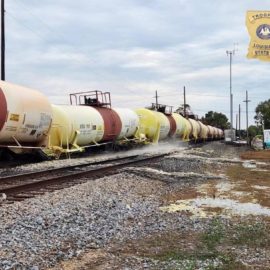
It is ridiculous that the local entity can be poor and the industry there get tax breaks. That is the Louisiana way.
St. James Parish doesn’t have to pay nearly $864,400 in back sales taxes and legal interest to Nucor Steel, the Louisiana Supreme Court has ruled, ending a six-year legal battle. It’s a win for a rural parish government and school system that have been reeling financially since the big Shell facility closed there in late 2020. But it’s a blow to a company that employs about 150 people and has struggled to meet emissions rules, among other problems. At issue is Nucor’s $750 million iron ore purification plant, which is part of the process for making steel. In 2013, the company built and started up the plant with a new kind of production system — the first of its kind in the U.S. — that was supposed to operate more efficiently and produce fewer greenhouse gasses and pollutants. But the technology has not produced the gains it promised, regulatory filings show. Emissions have been larger than expected and drawn violations from the state and recently the U.S. Environmental Protection Agency. The company is seeking to modify its air permit to allow more greenhouse gasses, sulfuric acid mist, hydrogen sulfide, sulfur dioxide and other emissions but significantly cut fine particulates. And the plant has had repeated production issues, according to Nucor’s own recent presentation to regulators.
theadvocate.com
It all goes back to the promised technology and it not working and so the plant got a refund.
In light of the mechanical problems, the company behind the new equipment, Tenova HYL, gave Nucor a refund in 2015 of more than $14 million on its $197.4 million purchase. So, in January 2016, Nucor sought an $821,092 sales tax refund from St. James Parish government and school board. The School Board, which is the primary administrator for sales tax collections, gave the company some small refunds, but, in 2018, denied the majority of the claim — about $665,382. The board did so after a two-year audit in which school auditors toured the plant, court papers say. Nucor appealed the denial to the Louisiana Board of Tax Appeals, but the board sided with St. James officials — and now, on June 29, so has the Supreme Court, relieving the local governments of returning the back taxes and an estimated $199,000 in legal interest.
To get the refund, the company had two different deadlines.
The arguments involve two different deadlines for a company to appeal a ruling in a tax dispute. If a company seeks a refund and the taxing authority does not take action within a year, the company has 180 days to appeal on the grounds that the authority has moved too slowly and failed to act. Separately, if a taxing authority does deny a refund request, the company has to file an appeal within 90 days. In an opinion written by Justice Jefferson D. Hughes III, the high court ruled that, while Nucor met the 90-day deadline, it failed to file an appeal within the other, 180-day deadline. And, in this case, the 180-day deadline took precedence. Hughes made that finding, even though that 180-day deadline passed nearly seven months before the School Board even denied Nucor’s refund request. When the School Board did deny the request, school officials told Nucor in a letter it had 90 days to appeal the decision. Nucor argued the negotiations and plant visits by the school board constituted “action,” but Hughes’ ruling says “action” only means approval or denial. It argues that interpreting the word otherwise would allow local tax administrators to string along companies indefinitely with “intermittent ‘acts'” that never lead to a decision. The Supreme Court overturned an appellate court ruling, but upheld the tax board’s ruling. Nucor did not return an email for comment, and one of its attorneys did not return a phone message for comment. School officials declined to comment Wednesday.
To win on a procedural error is a win but it ignores the moral one – should a parish give a tax break when the school system is in trouble? This has contributed to the poor public schools in the parishes.


